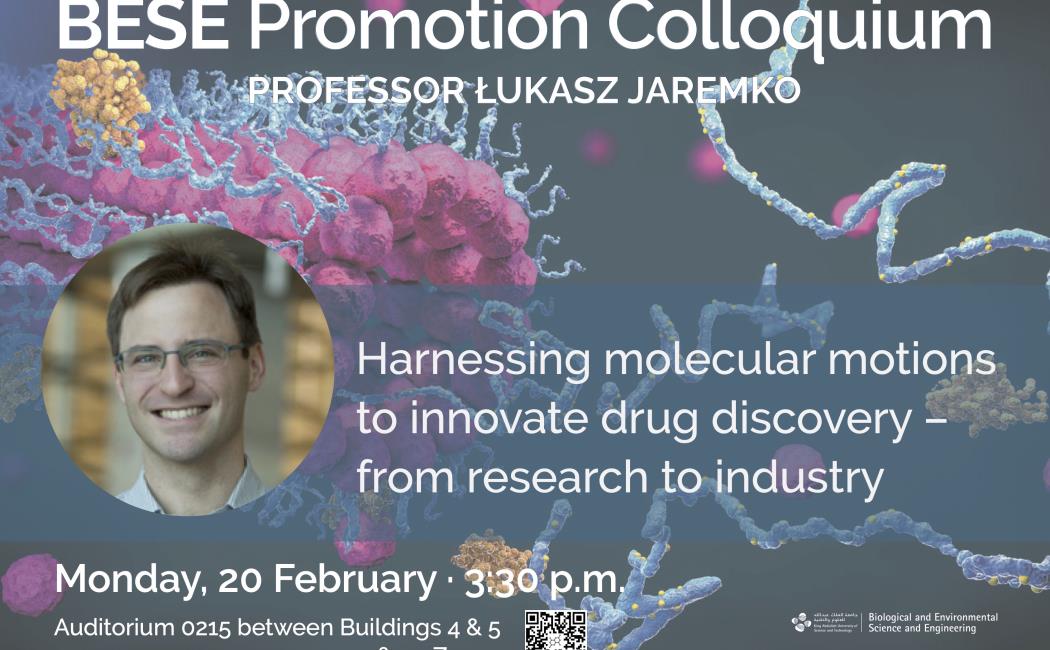
Promotion Colloquium – Prof. Lukasz Jaremko
As part of the current promotion cycle of the University, Professor Lukasz Jaremko is being considered for promotion to Associate Professor of Bioscience. A requirement of the promotion process is to give a technical colloquium. This colloquium will provide interesting insights into the research interests and achievements of Prof. Jaremko.
Abstract:
The dynamics of biomolecules play a primordial but still poorly understood role in all biochemical processes. Hence depicting and harnessing molecular dynamics is fundamental for understanding the biological function and treating diseases. Traditionally, studies have been performed using static atomic-resolution methods, including X-ray crystallography (X-ray), nuclear magnetic resonance (NMR), and cryogenic electron microscopy (cryo-EM). Recently, advanced computational analysis methods, such as artificial intelligence (AI)-augmented techniques, have emerged as a powerful tool for establishing static 3D structure models of many protein domains with often atomic accuracy. The static description, however, is insufficient to fully understand and modify the biological function. Indeed, many protein-protein, protein-nucleic acid, and protein-ligand interactions cannot be explained solely based on the static molecular architecture. Moreover, many biomolecules are partially or completely intrinsically disordered in their functional form, and thus cannot be captured and explained by a static representation.
My team at KAUST, the Molecular Diagnostics and Drug Discovery (MD3) research group, has been focusing on bringing the biomolecular structure research field from a classical 3D static understanding of shape and interactions into the 4D level, by integrating dynamics into the structural analysis. To better address health-related and environmental challenges both in the Kingdom of Saudi Arabia and worldwide, we are focusing on (1) motions of biomolecules, (2) molecular interactions, and (3) drug candidate discovery as three major pillars. Our vision is to generate fundamental insights that translate into more potent next-generation therapeutics and drugs.
We have successfully developed and published novel techniques, including NMR pulse programs, innovative protein-lead compound interaction analysis strategies, and experimental and computational tools to probe protein dynamic structures accurately. Our innovative research program pioneered and developed at KAUST aims to translate the research findings into small molecule drugs and therapeutics, for example, to battle cancer. For instance, we have identified the first-in-class specific fragments and ligands binding to several members of the tumour-related BTB family of transcription factors, previously regarded as "undruggable". Moreover, we were the first to identify the selective inhibitors targeting the MIZ1 transcription factor essential in c-MYC oncogene regulation. We are working on developing these compounds into more potent inhibitors to target c-MYC oncogene, which is dysregulated in over 70% of cancers. Moreover, the developed techniques can be equally applied to understand plant proteins' function, thus searching and designing efficient inhibitors to combat plant pathogens and enhance agricultural yields, strengthening food sustainability and security in the region and worldwide.
Bio:
Prof. Lukasz Jaremko completed his Ph.D. in December 2012 at the Warsaw University and the Institute of Biochemistry and Biophysics of the Polish Academy of Sciences in Warsaw, Poland. After four years as a postdoctoral fellow at the Max Plank Institute for Biophysical Chemistry in Goettingen, Germany, he joined KAUST in September 2017 as an Assistant Professor in Bioscience. He is a member of the KAUST Smart Health Initiative (SHI), a member of the Red Sea Research Center (RSRC) and an associate member of the Bioengineering Program. Prof. Lukasz Jaremko's research focuses on both developing methods in Structural Biology and applying them to address fundamental biological questions, developing drug candidates and establishing molecular diagnostic tools in personalized medicine.
